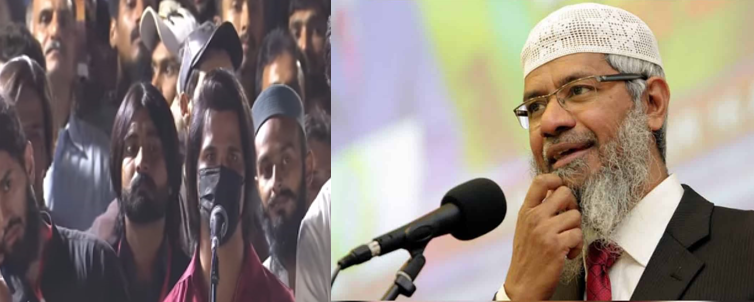By: Waqas Qamar Bhatti
Renowned Islamic scholar Dr. Zakir Naik recently visited Pakistan, where his statements stirred conversations both domestically and internationally. Known for his speeches on comparative religion, Dr. Naik’s visit highlighted various issues of faith, with some of his remarks becoming prominent headlines in the media.
During a public gathering, Dr. Naik touched on several sensitive topics, including marriage in religious scripture. Citing verses from the Bible, he addressed the Christian perspective on marriage, focusing on the principle of monogamy. He referenced biblical passages such as Genesis 2:24, 1 Timothy 3:2, Titus 1:6, and Hebrews 13:4, all of which emphasize the sanctity of marriage and the expectation that leaders of the church should have only one wife. These verses, according to Dr. Naik, affirm the biblical stance on Christian marriages.
A significant moment during his visit came when a Hindu Member of the Provincial Assembly from the Muttahida Qaumi Movement (MQM) posed a question to Dr. Naik about converting religion out of love, beyond the love of Allah and His Messenger. Dr. Naik responded by reiterating that Islam does not permit forced conversions, citing the Quranic principle that there is “no compulsion in religion.” His answer, while clear on the prohibition of forceful conversion, was seen by some as evasive regarding the emotional complexities of love and religious change.
One of Dr. Naik’s remarks during the visit became a widely discussed topic on social media. He claimed, “The chances of going to heaven are higher if you live in Pakistan.” This statement sparked debate, with some interpreting it as a call for Muslims to remain in Muslim-majority countries, and others questioning the implications for those living in non-Muslim nations. Dr. Naik’s suggestion that Muslims should avoid migrating to non-Muslim countries added to the controversy surrounding his visit.
Given the mixed reactions to his statements, many are calling for greater sensitivity in religious discourse. Critics argue that scholars like Dr. Zakir Naik should promote interfaith dialogue rather than focus solely on comparative religious arguments. Such dialogue, they believe, is essential for fostering understanding and harmony between people of different faiths.
Calls for Interfaith Dialogue and Peaceful Messaging:
Several observers and scholars have suggested that Dr. Naik, while knowledgeable and eloquent, should approach interfaith matters with more care, especially when addressing diverse audiences. Religious leaders and scholars are urged to present their messages in a peaceful and respectful manner to avoid misunderstandings or offense. Promoting Islam’s peaceful teachings and engaging in respectful dialogue with other faiths are seen as crucial steps in promoting global harmony.
Dr. Naik’s visit also underscores the importance of Pakistan’s role in promoting interfaith harmony at the international level. With its diverse religious landscape, the country has the potential to serve as a platform for constructive dialogue between different faiths. By presenting itself as a peaceful and inclusive society, Pakistan can enhance its image on the global stage and contribute to international efforts to promote religious tolerance.
Recommendations for Future Engagement:
Looking forward, scholars and religious leaders are encouraged to prioritize interfaith dialogue and cultivate mutual respect. The government of Pakistan is also advised to strengthen its efforts in promoting religious harmony both domestically and internationally, ensuring that future visits by influential figures like Dr. Zakir Naik can be leveraged to foster peace and understanding across communities.
While Dr. Naik’s visit sparked significant attention, it also highlighted the need for thoughtful discourse and sensitivity when discussing religious matters in diverse settings. The path forward calls for constructive dialogue that bridges differences and promotes the values of mutual respect, peace, and harmony.


